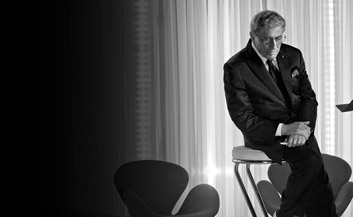Movie Review: The Zen of Bennett
By Matthew Huntley
November 7, 2012
BoxOfficeProphets.com

Like many legends, Bennett’s life story has been one of perseverance and a series of ups and downs, but The Zen of Bennett isn’t interested in his entire picture; this film is specifically about Bennett’s outlook on life at this particular moment in time (it was filmed around the time he turned 85), which, according to Bennett, is as good a time as any to reflect back and talk about one of his enduring philosophies: if something works, simply let it continue to work and allow the changing times to adapt to you. It doesn’t always have to be the other way around.
This notion is instilled upon us at the beginning of the film, when Bennett mentions how in the early 1930s, at the onset of the Great Depression, people took greater pride in the things they made, when craftsmanship, quality and durability for things like suits were higher because they were meant to last and people could only afford to buy them once. Over time, these standards gave way to mass production, quick assembly and the idea that if something no longer works, simply buy a new one. Bennett never adopted this mode of thinking, and one of the running questions throughout the film is why should we? Another question that comes to mind is why do something just to get it done? Bennett is of the opinion that everything should have purpose and meaning, and we should always be proud of what we do. Otherwise, we’re not really living.
Of course, The Zen of Bennett, produced and conceived by his son Danny and directed by Unjoo Moon, is more or less told singularly from the point of view of Bennett himself, and so there are no counter arguments to what he’s saying and the movie offers few terribly in-depth moments that allow us to see how he came to develop such principles (we just accept he has them). Nevertheless, we enjoy the film for its simple beauty and heart, and because its subject is such an utter, positive delight, a man who still wears a suit to work - not only out of respect for himself, but also his colleagues and fans - and who approaches nearly everything with a halcyon point of view. For instance, he still says please and thank you, manners that have sadly become old-fashioned, a concept that would probably have Bennett asking why.
Aside from his resilient singing career, across which he’s sold over 50 million records, and which he’s managed to keep intact for over 60 years, appealing to an uncharacteristically broad audience - there’s a teeth-gratingly long take where Tony and Danny debate whether Tony caters to one or several demographics and both men fail to see they’re actually saying the same thing - Tony has made a name for himself as a painter under his given name, Anthony Benedetto (his stage name, Tony Bennett, was given to him by Bob Hope). Among his works are portraits of his fellow artists like Willie Nelson and painted landscapes of all the places he travels, which is a lot. The film alone shows him in a recording studio in Los Angeles; in his New York City apartment overlooking Central Park; visiting Andrea Bocelli at his home in Italy; and in London and Memphis, among other places. It uses these locations to show us that Bennett is virtually ageless (and perhaps limitless) when it comes to the diverse pedigree of talent he works with, including Carrie Underwood, John Mayer, Michael Bublé, Lady Gaga, Aretha Franklin and the late Amy Winehouse, whom he regrets not talking to about her drug problem.
Through it all, we spend time with a man who views life as though it was a gift, a gift that’s worth celebrating each and every day; a man who holds learning and hard work in the highest regard (and who believes you’re never too old to learn something new); a man who, after serving in the infantry unit in World War II, believes killing to be the lowest form of human behavior because it means we’ve lost sight of how precious life is; and a man who believes the highest form of human behavior is attempting to appreciate nature, a beauty and concept that may be beyond our complete understanding but is definitely worth investigating.
As a documentary, The Zen of Bennett sometimes borders on cheese and some scenes are obviously staged for emotional and dramatic effect, but the man at the center always comes off as true and genuine. Sure, Bennett’s philosophies stem from someone who now has seemingly unlimited resources and luxuries, but I’m convinced he worked and suffered for them. That’s what the film had me believe, anyway. Danny said he wanted to make “a love letter to his father,” and when viewed in that context, it’s lovely, heartfelt and engaging. Bennett says he loves to entertain because it makes people feel good. Well, he’d be happy to know this film makes us feel good.